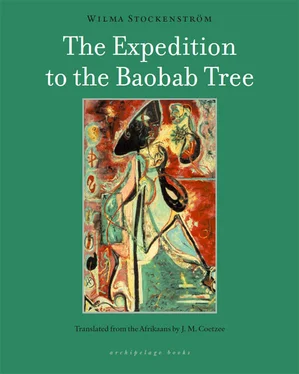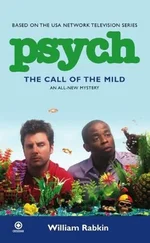The giant heron cocked his head. He took one step, another, made sure that his shadow was not falling on the water, and stiffened. The ducks, on the other hand, drifted blandly, quacking, rocking, wagging their tails. The kingfisher had disappeared. Against the pale green background of the wild figs only the tree trunk fleet stood out, edging forward in painfully slow motion.
I began to get a cramp from lying so still and wished that the warriors, if that was what they were, would hurry up. Also I wanted to sneeze. I doubted that they would hear me so far across the water, but held out for safety’s sake. If they were warriors and if they were hostile to us, then all would be up with us. And before I was caught — this I had vowed to myself — before I was caught I would snatch the stranger’s dagger that he carried in a girdle around his waist and kill myself. Warriors or not, it looked like a show of force of some kind passing us on the way upriver. From where? Where to? It had been a long time since we had seen a village or one of the ruins, or cultivated lands with platforms on which boys sat making a great noise to scare away the swarms of red-beak finches, or herds of sanga cattle with their child herders, or women come to fetch water or to bathe sitting on flat rocks and scouring their soles with stones and joking and laughing boisterously.
We had long since left the beaten track of the gold and slave routes and followed a course determined by the stories of those seafarers and the desire to be the first to discover a shorter, easier way to their cities and open trade possibilities. The first to discover. To be first. At the forefront of innovation. First to return with an impressive report. What would we sell? Slaves? Ivory? Tortoiseshell? Gold? First find out, before anyone else, before all competitors, what commodities these people needed and what they could offer in exchange, and find out on the spot so that you could speak with authority and be the first to celebrate the victory of big easy profits. That was what it meant to play the discoverer.
I think the two of them had underestimated the game. It also seemed to me that they realized this but were absolutely refusing to acknowledge it. Now it was a matter of pushing on, pushing through. It was a fact that somewhere in the distance lay cities that carried on commerce. It was known that the earth was ultimately ringed around with water. One day, one day, suddenly, unexpectedly, there would loom up before our eyes a blueness which, as we approached, would grow distinct from the blue haziness of the sky and announce itself as a separate entity, as being composed of water, as being water, as being water in motion with waves with foam backs and splashing foam flakes. As being the water firmament on the edge of eternity. And we would hear a pounding and perhaps seabirds. And the last stretch we would all run.
Ah, how pleasant to meditate ahead, to listen, see, smell, feel ahead. To imagine experiences.
Our stock of food was diminishing and gave cause for concern. We grew dependent on the skill of the slaves and the knowledge of the wilds they had acquired as children to supplement our food. Thus, for example, they picked out a round orange fruit full of big pips with a thin layer of nice sweet flesh. And they picked out edible grubs: they pulled them off the leaves and pinched their heads off and baked what was left — which was not much — in the hot ashes.
I was imprudent enough to compliment them foolishly and long-windedly. I looked them boldly in the eye, created a relationship of familiarity, then cupped my hands and got a share of their fruit, berries, grubs, roots. Then I went and sat down with my gift halfway between them and the stranger and the eldest son. After a while the stranger came to join me and I gave him some of what I had. Then he shared his little with the eldest son. A complicated system. But the situation was not yet critical.
Funny incidents, like the time the eldest son caught a freshwater turtle and tried to roast it in the shell. It gave off such an intolerable stench that we all retired and no one would let it pass his lips, including the catcher and roaster.
Less amusing the incident with the sable antelope hit by lightning. Looking back I can in fact laugh bitterly. I can still see the stranger bringing out his elegant little dagger with the handle inlaid with jewels — emeralds and carnelians polished till they glittered — and trying to slice through the skin of the antelope’s belly. He must have begun there because he thought the skin would be thinner in the groin.
Some distance away the slaves stood grimly looking on after unanimously deciding not to touch what seemed to us a lavish gift. A first sign of mutiny, perhaps? I don’t know. The eldest son contributed by holding the antelope fast by the horns. The animal anyhow had no kick left in it. The stranger gave up the struggle. No one thought of looking for butchering equipment among the goods we were carrying. Or an axe or a spear or something of the kind.
The antelope’s glassy eyes were looking at me wherever I circled around him, I thought fearfully. Perhaps the lightning bolt had merely stunned him. But no, he was really dead. We had chased pied crows away from him. These had not yet gone. They were hobbling about here self-righteously. Waiting. Waiting. Till the tedious human left. When I looked up I noticed a vulture in a treetop. The stranger gave a snort of laughter when I approached and asked why he did not look for equipment in the supplies.
Both he and the eldest son had from the very beginning pushed their weapons into one of the packs because it was too much trouble to keep them continually at hand. They were simply in the way. What prevented the slaves from overpowering the two of them, doing away with them, and making off? Were they then so unmanned? I thought I detected a glint in the slaves’ eyes. They were watching like the crows were.
From the tiny slit the stranger had made with his dagger in the belly a slow dark fluid oozed on to the white hair. The air smelled wonderfully fresh after the rain. I wished we would leave. One could see a rainbow. There, far away at its foot slept the lightning. I wished a lightning flash would make the sable jump up and storm us.
Summer was starting to grow full and ripe. It was in winter that we had last seen the sea. Vague salty damp memory. Grown so used to this routine.
After an evening’s consultation the two leaders decided we should cross the great river along whose bank we had been walking for a while now, so as not to lose our course yonder towards the sunset. Their joint fright at the prince or commander and his subjects or troops in the hollowed-out tree trunks had moderated the discord between them. This nearly flared up again when the stranger teasingly asked the eldest son whether he would be able to pick out a hissing tree for the building of a vessel.
Would you? asked the eldest son sullenly. Then they both laughed with embarrassment. Here, so far from home and hearth and from the sea, they sensed their relative powerlessness and saw only too well that they did not always have the situation under control. The eldest son slapped his calf with his cane, but listlessly, as if confessing impotence. I saw in their eyes that they did not know what to do. Men look so funny, like disappointed children, when they lose control of something but dare not openly acknowledge it. And I in my peculiar position as parasite hoped fervently that they would find a solution and get us shortly to those cities that were our ostensible goal. Every morning I blossomed at my most beautiful, for them to admire my orchid-like nature for its colorfulness. I gave no less attention to my appearance than in town. My private torments were increasing too. I was utterly dependent on him to whom I was joined by deeds of sale as well as (I hoped to myself) by affection. But utterly dependent like a parasite.
Читать дальше












